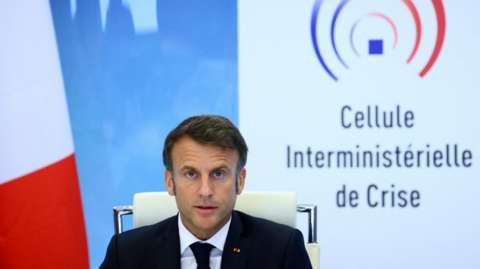Kremlin Spokesman, Dmitry Peskov has disclosed that French President, Emmanuel Macron spoke by telephone with Russian President, Vladimir Putin last night in their first direct conversation in almost three years.
Peskov claimed that the call was organised after a request by Macron. “It was the French side’s idea,” he said, adding that Putin had “repeatedly stated his willingness to engage in dialogue.”
He praised the talks, which lasted over hours, as “very substantive.”
Downplaying the possibility of a meeting between Putin and Macron, Peskov told reporters that phone communication between the Russian and French Presidents remains sufficient for exchanging views. “They have not discussed such a meeting,” he noted.
According to the Élysée, Ukrainian President, Volodymyr Zelenskyy was told about the call in advance.
During the call, Macron urged Putin to accept a ceasefire in Ukraine, but Russia’s leader hit back by blaming the West for the conflict.
Putin told Macron that “the Ukrainian conflict is a direct consequence of the policy of western states.”
The Élysée Palace said in its readout that Macron emphasised France’s unwavering support for Ukraine’s sovereignty and territorial integrity and “called for the establishment, as soon as possible, of a ceasefire and the launch of negotiations between Ukraine and Russia for a solid and lasting settlement of the conflict.”
The call was welcomed by the Hungarian Prime Minister, Viktor Orbán, who repeatedly criticised the EU’s policy on Russia and called for more engagement with Moscow.
“Finally!!! There is no solution to the Russia-Ukraine war on the battlefield. The key is negotiation. We need diplomats, not generals!”
Viktor Orban
Macron, Putin Discuss Iran
Moreover, the two leaders spoke about Iran to “coordinate their efforts” . They agreed to “speak soon in order to follow up together on this issue.”
In statements after the two-hour phone call, a French spokesperson disclosed that Macron was left more positive about the possibility of Russia pressing Iran to restore cooperation with the nuclear inspectorate, the International Atomic Energy Agency (IAEA).
The French President indicated a willingness to discuss the Iranian red line that it must have a right to enrich uranium domestically.
One reason given by Iran for ending cooperation with the IAEA is the failure of the agency’s leadership to condemn the Israeli attacks on its nuclear sites as a flagrant violation of the nuclear non-proliferation treaty.
The Kremlin readout of the Macron-Putin call said it was noted that respecting Tehran’s legitimate right to develop peaceful nuclear technology and continue to fulfil its obligations under the treaty on the non-proliferation of nuclear weapons, which includes cooperating with the IAEA, was crucial.”
It revealed that the two leaders spoke in favour of settling the crisis around Iran’s nuclear programme and any other differences arising in the Middle East exclusively via political and diplomatic means. It added, “They agreed to maintain contact in order to coordinate their stances if necessary.”
Iran has been steadily moving towards freezing out the IAEA, making it harder for any independent assessment to be made of the scale of the damage inflicted on Iran’s nuclear sites by the US and Israel strikes.
On June 25, 2025, the day after the ceasefire that ended 12 days of war, the Iranian parliament overwhelmingly voted for a bill suspending cooperation between Iran and UN agency.
The law was then approved by the guardian council, the body responsible for reviewing legislation in Iran, before being ratified by the Iranian President, Masoud Pezeshkian.



















